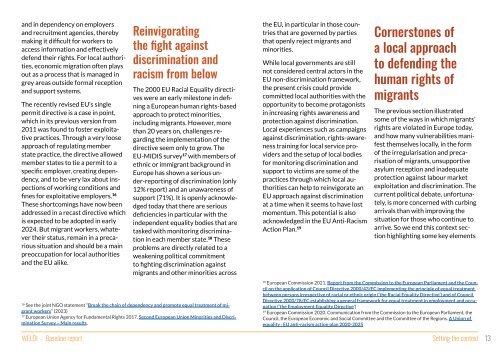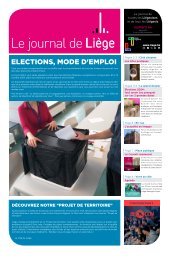Create successful ePaper yourself
Turn your PDF publications into a flip-book with our unique Google optimized e-Paper software.
and in dependency on employers<br />
and recruitment agencies, thereby<br />
making it difficult for workers to<br />
access information and effectively<br />
defend their rights. For local authorities,<br />
economic migration often plays<br />
out as a process that is managed in<br />
grey areas outside formal reception<br />
and support systems.<br />
The recently revised EU’s single<br />
permit directive is a case in point,<br />
which in its previous version from<br />
2011 was found to foster exploitative<br />
practices. Through a very loose<br />
approach of regulating member<br />
state practice, the directive allowed<br />
member states to tie a permit to a<br />
specific employer, creating dependency,<br />
and to be very lax about inspections<br />
of working conditions and<br />
fines for exploitative employers. 16<br />
These shortcomings have now been<br />
addressed in a recast directive which<br />
is expected to be adopted in early<br />
2024. But migrant workers, whatever<br />
their status, remain in a precarious<br />
situation and should be a main<br />
preoccupation for local authorities<br />
and the EU alike.<br />
<strong>WELDI</strong> - Baseline <strong>report</strong><br />
Reinvigorating<br />
the fight against<br />
discrimination and<br />
racism from below<br />
The 2000 EU Racial Equality directives<br />
were an early milestone in defining<br />
a European human rights-based<br />
approach to protect minorities,<br />
including migrants. However, more<br />
than 20 years on, challenges regarding<br />
the implementation of the<br />
directive seem only to grow. The<br />
EU-MIDIS survey 17 with members of<br />
ethnic or immigrant background in<br />
Europe has shown a serious under-<strong>report</strong>ing<br />
of discrimination (only<br />
12% <strong>report</strong>) and an unawareness of<br />
support (71%). It is openly acknowledged<br />
today that there are serious<br />
deficiencies in particular with the<br />
independent equality bodies that are<br />
tasked with monitoring discrimination<br />
in each member state. 18 These<br />
problems are directly related to a<br />
weakening political commitment<br />
to fighting discrimination against<br />
migrants and other minorities across<br />
16<br />
See the joint NGO statement “Break the chain of dependency and promote equal treatment of migrant<br />
workers” (2023)<br />
17<br />
European Union Agency for Fundamental Rights 2017. Second European Union Minorities and Discrimination<br />
Survey – Main results.<br />
the EU, in particular in those countries<br />
that are governed by parties<br />
that openly reject migrants and<br />
minorities.<br />
While local governments are still<br />
not considered central actors in the<br />
EU non-discrimination framework,<br />
the present crisis could provide<br />
committed local authorities with the<br />
opportunity to become protagonists<br />
in increasing rights awareness and<br />
protection against discrimination.<br />
Local experiences such as campaigns<br />
against discrimination, rights-awareness<br />
training for local service providers<br />
and the setup of local bodies<br />
for monitoring discrimination and<br />
support to victims are some of the<br />
practices through which local authorities<br />
can help to reinvigorate an<br />
EU approach against discrimination<br />
at a time when it seems to have lost<br />
momentum. This potential is also<br />
acknowledged in the EU Anti-Racism<br />
Action Plan. 19<br />
Cornerstones of<br />
a local approach<br />
to defending the<br />
human rights of<br />
migrants<br />
The previous section illustrated<br />
some of the ways in which migrants’<br />
rights are violated in Europe today,<br />
and how many vulnerabilities manifest<br />
themselves locally, in the form<br />
of the irregularisation and precarisation<br />
of migrants, unsupportive<br />
asylum reception and inadequate<br />
protection against labour market<br />
exploitation and discrimination. The<br />
current political debate, unfortunately,<br />
is more concerned with curbing<br />
arrivals than with improving the<br />
situation for those who continue to<br />
arrive. So we end this context section<br />
highlighting some key elements<br />
18<br />
European Commission 2021. Report from the Commission to the European Parliament and the Council<br />
on the application of Council Directive 2000/43/EC implementing the principle of equal treatment<br />
between persons irrespective of racial or ethnic origin (‘the Racial Equality Directive’) and of Council<br />
Directive 2000/78/EC establishing a general framework for equal treatment in employment and occupation<br />
(‘the Employment Equality Directive’)<br />
19<br />
European Commission 2020. Communication from the Commission to the European Parliament, the<br />
Council, the European Economic and Social Committee and the Committee of the Regions. A Union of<br />
equality : EU anti-racism action plan 2020-2025<br />
Setting the context 13
















